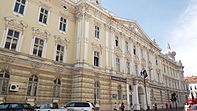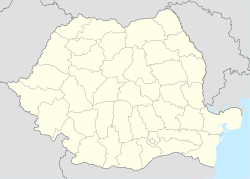Coat of arms of Arad
| Arad | |||
|---|---|---|---|
| Municipality | |||
       
From top, left to right: Arad City Hall, Cenad Palace, The Red Church, St. Anthony of Padua Church, Moise Nicoara National College, Ioan Slavici National Theatre, Statue of St. Nepomuk's, Aurel Vlaicu University
|
|||
|
|||
| Location of Arad, Romania | |||
| Coordinates: 46°10′N 21°19′E / 46.167°N 21.317°ECoordinates: 46°10′N 21°19′E / 46.167°N 21.317°E | |||
| Country |
|
||
| County | Arad County | ||
| Status | Municipality | ||
| Government | |||
| • Mayor | Gheorghe Falcă (Democratic Liberal Party) | ||
| Area | |||
| • Total | 46.18 km2 (17.83 sq mi) | ||
| Elevation | 117 m (384 ft) | ||
| Population (2011 census) | |||
| • Total | 159,704 | ||
| • Density | 3,500/km2 (9,000/sq mi) | ||
| Time zone | EET (UTC+2) | ||
| • Summer (DST) | EEST (UTC+3) | ||
| Postal code | 31xxx | ||
| Area code(s) | (+40) 02 57 | ||
| Vehicle registration | AR | ||
| Climate | Cfb | ||
| Website | primariaarad.ro | ||
Arad (Romanian pronunciation: [aˈrad]; Hungarian: Arad; Serbian: Арад/Arad) is the capital city of Arad County, historically situated in the region of Crișana, and having recently extended on the left bank of the Mureș river, in Banat region of western Romania.
An important industrial center and transportation hub on the Mureș River, Arad is also the seat of a Romanian Orthodox archbishop and features two universities, a Romanian Orthodox theological seminary and a training school for teachers. It had one of the first music conservatories in Europe. The city has a population of 159,704, making it the 12th largest city in Romania. Arad is the third largest city in the western part of the country, behind Timișoara and Oradea.
Arad was first mentioned in documents in the 11th century. The Mongol invasion of the Kingdom of Hungary in 1241 showed the importance of the fortifications on this place, to which were added in the second half of the 13th century more stone fortresses at Șoimoș, Șiria, and Dezna. The Ottoman Empire conquered the region from Hungary in 1551 and kept it until the Peace of Karlowitz of 1699. Arad became an eyalet center, which comprised the sanjaks of Arad, Lugoj, Kacaș, Beşlek and Yanova from 1660 till 1697, when it was captured by Austrians (Serbian Militia under command of Subota Jović) during Ottoman-Habsburg wars (1683–1699). After 1699, the city was ruled by the Habsburg Monarchy. At the beginning of the 18th century, Arad became the center of the Eastern Orthodox Eparchy of Arad. According to 1720 data, the population of the city was composed of 177 Romanian families, 162 Serbian, and 35 Hungarian.
...
Wikipedia



